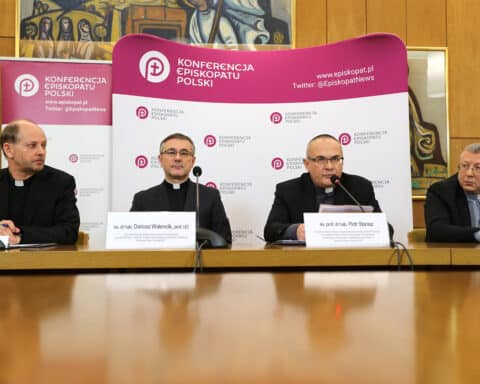I recently heard a story about a group of Catholics doing what we are constantly being invited to do — namely, meeting people where they are at. In this particular case, that was on the sidewalk to engage them in conversation about the things that matter most. As you might expect, it did not take long for them to encounter a person claiming to be “spiritual but not religious.” A priest with the group had a ready reply: “So are the demons. Be more specific!”
This question led to a genuine conversation by cutting through the kinds of linguistic obfuscations all of us use, in one context or another, to avoid dealing with real questions.
To be spiritual
What exactly does it mean to be spiritual? Does it mean believing in a higher power? Or participating in certain practices, such as meditation or community service or reading your daily horoscope or yoga or praying the Rosary? As this list shows, “spiritual” is hardly a precise descriptor.
To be spiritual is to have needs and capacities beyond the physical. The fact that we have physical needs and capacities does not negate the fact that we also have spiritual ones. That humans need not only food, water, air and shelter, but also things like community, a sense of identity, a purpose in life and a coherent set of values means that we are spiritual.
While some people are more attuned to these needs and intentional about meeting them, and so in that sense more spiritual, in another sense, every human person is spiritual by virtue of being human.
A comparison with one of our physical needs can be illuminating here. In one sense, we say that a person is on a diet if they are following a fairly regimented and intentional plan for their eating. But in another sense, we speak of our diet as simply what we eat. Anyone who eats — anyone who is doing anything at all to meet their need for nourishment — has a diet. It might be a healthy diet or an unhealthy one. It might be intentional or haphazard. It might be serving you well or serving you poorly. Regardless, everyone has a diet.
The same is true of spirituality. The question is not whether you have one, but whether or not it is leading you toward or away from the basic spiritual needs at the heart of being human. Even practices that help you to avoid those needs — think of the kinds of things that often lead to addiction — are a form of spirituality, a way of dealing with, however poorly, the kind of thing you are.
To be religious
We are all spiritual. What about religious?
Again, it depends on how the terms are being used. Like “spiritual,” the term “religious” too often gives the impression that some people are “religious” and others are not. And, of course, there is value in distinguishing between people who practice what we typically call religion and those who don’t. On the other hand, opting out of religion is not so easy as it seems.
There is no avoiding forming a worldview through which you approach your life. Everyone has some ethics from somewhere. And it is not just ethics. We all practice liturgies, even if those liturgies are Pride parades and football games, and go through liturgical seasons, including feasts like Black Friday and the Fourth of July.
A key advantage to practicing what we typically call “religion” is the level of accountability and intentionality it brings. Communities of faith have traditions of thinking and living that have been tested down the centuries. We are unlikely to find that wisdom on our own, let alone live it well without some circle of support. Again, the analogy with diet plans is instructive here.
Too often, the claim to be spiritual but not religious can be a way of not taking seriously the task of being human. It can allow us to present as sensitive and open without any of the discipline or thoughtfulness that makes a spirituality a truly healthy one.
All of this, of course, leaves aside for the moment any truth claims made by specific religions. Whether the claims of our Catholic faith are true matters immensely, even infinitely. But for many contemporary people, we need to clear some other ground. Thinking clearly about what we mean by words like “spiritual” and “religious” is a good first step.





